Famous Detective Stories: True Tales Of Australian Crime

Famous Detective Stories: True Tales of Australian Crime
National Library of Australia
ISBN: 9780642278906, RRP $24.99, Available 1 July 2016
A few weeks ago a great easy to hold, perfect for all those who love to find things in Trove, new book arrived from the National Library of Australia.
Famous Detective Stories: True Tales of Australian Crime sent us back into the records being gradually digistised by the NLA to track down the threads of local crimes and the way they were presented.
When pulp magazines started to leap off Australian newsstands and railway station bookstands in the 1930s, some decried them as evidence of moral and cultural decay. Despite this opposition continuing for another two decades, pulp series Famous Detective Stories would go on to become literary entrepreneur Frank Johnson's most successful and longest —running title. From 1946, he gathered around him moonlighting journalists, former police detectives and keen amateurs, who, armed with news clippings of infamous crimes, produced story after story for a reading public who craved more.
Famous Detective Stories: True Tales of Australian Crime is a collection of these sensational and often grisly tales ranging from the serious regaling of murders, lady killers, cattle stealing thieves, gun battles in North Sydney and slave trafficking, to delightfully devious yarns of the illegal importation of Irish stout and a bizarre feud over a church pew' one of our favourites!
A taste from 'See You In Church' so you know what we mean:
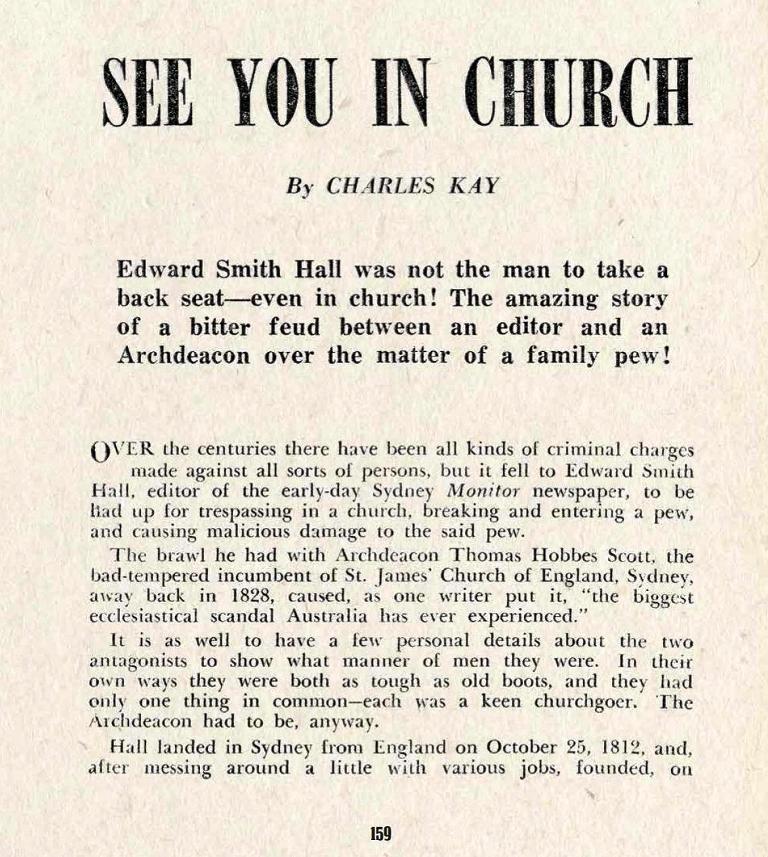
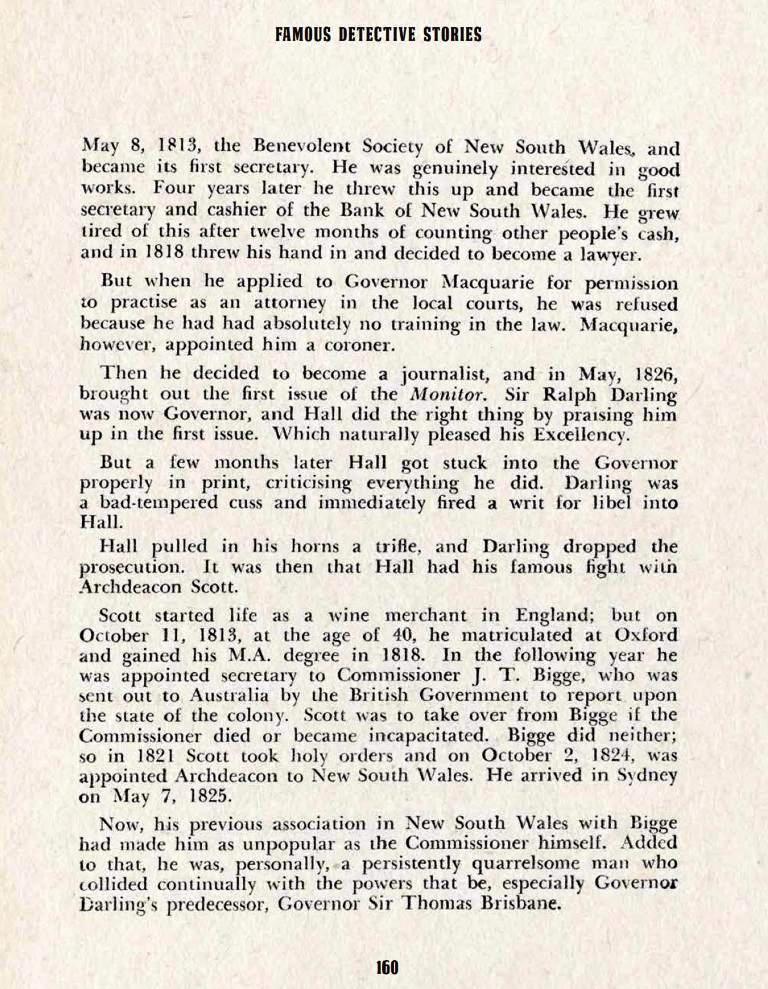
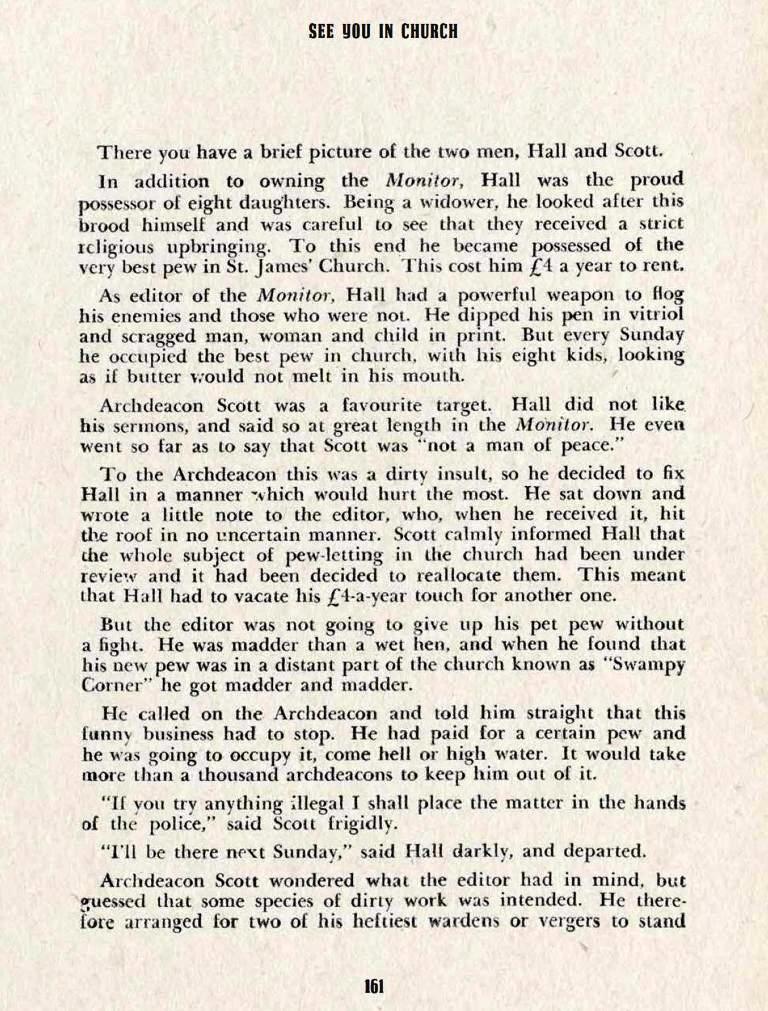
Though the tales are told by a number of authors, and most of the cases were highly contentious at the time, they are related in a friendly and somewhat fantastical tone that modern readers will find refreshingly unusual and entertaining.
This collection draws from the vivid images of the Famous Detective Stories with the use of a number of distinct 1940's and 50's covers taken from the original books. The tawdry, lurid covers originally were designed to titillate and tiptoed close to the censor's line and still have a melodramatic, noir appeal. Accompanying this are a great number of newspaper clippings and photos about the crimes which inspired the stories and where most often lifted from the news, giving historical context to the eras and events.
Delve into the stories and illustrations which were a part of Australia's publishing golden age and were once decried as having zero artistic value, yet went on to highly influence the decades to come and modern tastes. These notorious pulp stories have been resurrected for the delectation of the Australian public once again; offering high drama entertainment and a look into our publishing and reading history.
We certainly couldn’t put it down until finished!
Great for all those who love Australian History or to find out more about how we thought and spoke, and how that has changed – or for any who like a darn good read!
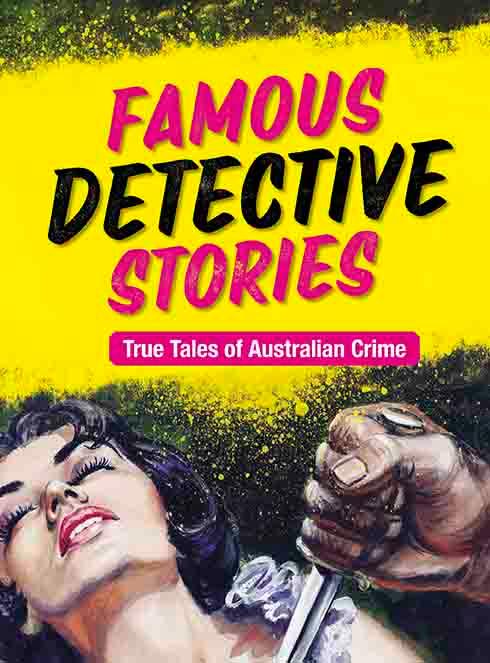 Famous Detective Stories: True Tales of Australian Crime
Famous Detective Stories: True Tales of Australian Crime
Author: National Library of Australia
Publisher: National Library of Australia
Edition: 1st Edition - ISBN: 9780642278906 - Pages: 184
Publication Date: 01 July 2016
Price $24.99 - Available to purchase online
From the notorious Louisa Collins in 1880s NSW, who murdered two husbands with rat poison, to a blazing shootout featuring prominent underworld figure Antonio Martini at Taronga Zoo in the 1940s this book features stories of true crimes that shocked and thrilled the Australian public.
Meet Baldy, the down-and-out swagman, ratted out and murdered by his mate Curly in late nineteenth-century Victoria; Percival William Budd, who proclaimed his innocence to the end, smiling at the hangman as he went to his death; and the glamorous Kathleen Biliski, whose outfits and beauty were reported on by a breathless press, while she mourned her murdered lover.
Published as pulp fiction in the early 1950s, and luridly illustrated, the original Famous Detective Stories catalogued murders, love triangles, great escapes, slave trading and robberies. Here, each story is followed by the often sensationalist newspaper cuttings of the time, which report every gruesome detail of the crime with relish.
From the notorious Louisa Collins in 1880s NSW, who murdered two husbands with rat poison, to a blazing shootout featuring prominent underworld figure Antonio Martini at Taronga Zoo in the 1940s this book features stories of true crimes that shocked and thrilled the Australian public.
The National Library of Australia's TROVE allows you to find and get over 500,536,020 Australian and online resources: books, images, historic newspapers, maps, music, archives and more.
It's more than a search engine. Trove brings together content from libraries, museums, archives, repositories and other research and collecting organisations big and small. A list of contributors and partners whose collections are included in Trove can be viewed online.
Trove's origins can be traced back to a project launched by the National Library of Australia in August 2008. Its aim was to build a portal for all of the Library’s online discovery services, including the Register of Australian Archives and Manuscripts, Picture Australia, Libraries Australia, Music Australia, Australia Dancing, PANDORA web archive, ARROW Discovery Service and the Australian Newspapers Beta service.
Today Trove is transformed, growing far beyond its original purpose and becoming many things to many people: a community, a set of services, an aggregation of metadata, and a growing repository of full text digital resources. Trove is a platform on which new knowledge is being built. It is a collaboration between the National Library, Australia's State and Territory libraries and hundreds of cultural and research institutions around Australia, working together to create a legacy of Australia’s knowledge for now and into the future.
Best of all, Trove is yours. As you text correct, comment, tag or contribute content you are helping to build a better service for everyone.
As regular readers would know, it's one of our 'got to' resources for finding those tiny threads relating to Pittwater histories that allow us to find out more about subjects, about people...even to the point of their dog's name - from 200 years ago! or images that haven't been seen yet and even those thta have but haven't been reunited with the reason for them being taken - what was happening, and when.
This 'pulp fiction' paperback, reproduced along similar lines as the original so you may curl up and read, illustrates what can be found and how great this resource, for all Australians, is in being realised by this great library.
For example, we were able to find out more about the 'word skirmish' referred to the above item, wonderfully reproduced to read as a 'True Tale' in 'See You in Church':
REX v. E. S. HALL.
THIS suit, which has excited so lively an interest not only in Sydney, but in every village in the Colony, came on for trial on Thursday. It was an information against Mr. E. S. Hall, a parishioner of the Parish of St. Lawrence, Sydney, for a trespass in breaking the door of a pew previously occupied by him in the Parish Church of St. James, Sydney, after having received notice from the Registrar of the Archdeacon's Court, to quit the said pew.
The Solicitor General conducted the case for the Crown. The Defendant appeared in person. The Solicitor General stated the facts of the case, which were generally admitted by the Defendant, and concluded a lucid but brief narrative, of the case, by stating, that the information was brought to try the right, not to recover damages, and to convince the Defendant that a due submission to lawful authority was imperative upon him and all others. (But as the facts were all elicited from the evidences brought forward, we shall not here repeat them.)
The following witnesses were then, called.
Mr. James Young examined. - I am collector of the rents of the pews of St. James's. In the month of July last, I was directed to call upon the Defendant for £3. being six months rent each of the years 1827 and 1828. There had been application made for the rent a few weeks previously. In the latter part of June, Mr. E. S. Hall called upon me, in consequence of an intimation made from me. Mr. H. paid me £3., at the same time offering me money in advance. I did not accept it; I had been instructed to that effect by the Rev. Mr. Hill. I recollect Sunday the 6th of July last; It was a sacrament Sunday. Mr. Hill is officiating Minister of St. James's. Sacrament Sundays are the first Sunday of each month. I recollect seeing Mr. Hall enter their Church in the evening service. I saw him walk up the aisle towards his pew, and climb over into it. Cannot say whether it was locked or not. Saw Mr. Hall previously in conversation with the beadles; thought the beadles were endeavouring to keep him back. The pew is about 4 ft. 8 in. in height. I saw Mr. H. afterwards lift his children into the pew from the north aisle. I saw Mr. Hall's eldest daughters a few minutes after, walk round into the other aisle and enter the pew by the door.
Cross-examined--My authority to collect monies from the parishioners is from Mr. Hill. My instructions on this head are verbal; they are, to collect subscriptions as fast as ,they become due; I mean the rentals of the pews. I gene rally appoint persons to pews, but it is by the authority of Mr. Hill. I have considered Mr.Hill's word to collect monies from the parishioners a sufficient authority. I called upon Mr. Hall for the rent of the pew which Mr. Hall got over into. I last collected money from Mr. Hall in the month of June. [A receipt was here put into the witness's hand.] This is a receipt for the rental of Mr. H's pew; the date of it is the 27th of June, 1828, and expresses in the body, that it was for rent due on the 30th of same month. Consequently, the rent was paid three days before it was due; it was half a years' rent.
I have never known any other person dispossessed of a pew against their consent save the Defendant. They have been allowed to resign them at pleasure, but were never ejected. Mr. Hill gave me instructions not to receive any money in advance of rent from Mr. Hall in particular. I would have received rent in advance from any other parishioiner. I think Mr. Hill mentioned that the pew did not belong any longer to Mr. Hall. I did not ask Mr. Hall for any rent when he first occupied it. Mr. Hall had possession of the pew twelve months before he was called upon for payment. I am not aware of any other parishioner besides Mr. Hall being ejected against his consent; yet if such had been the case, I must have known it. (The Solicitor-General admitted that Mr. Hall was the first person ejected. Mr. Hall - But I want to prove that this is the only instance, as well as the first.)
There has been a new appropriation of pews in St. James's Church; some it dispossessed of their former pews, some it did not. It has came to my knowledge, that Mr. Sheriff James has had another pew, because he did not like the new regulation. I believe Mr. Hill, butcher, and Captain Raine, have also been reinstated in their old pews, because they did not like the new regulations. Captain R.was moved, and then moved back again. Captain R. was removed to a pew situated before his old one, and was then moved back again. I think it is not likely be will be shifted again next Sunday. Mr. E S Hall has mentioned to me that he would accept of a pew in lieu lieu of his old one, if it were as convenient to his family, and not cold and dark.
There are a great many parishioners that have not paid in advance. There are some who have paid not at all. There are instances of a parishioner declining to pay rent, but whenever he has paid his rent, he has always held his pew without interruption - always at least until the late pew appropriatlon. It was prior to the receipts now produced that Mr. Hill gave me instructions to take no money in advance from Mr. Hall. I cannot swear positively whether it was prior, or subsequently to the 27th of June last, that I received instructions from Mr. Hill to receive no advance front Mr. Hall. On recollection, I am certain that it was on the 27th of June. For it was on on the 24th of June that I called on Mr. Hall and received a memorandum, a kind of order or note, which paid up what was due, and six months in advance. The same evening I waited on Mr. Hall at his house, and returned the promissory note. The note was received by me in the usual way as Collector. The two receipts now produced are dated the 27th of June, and the monies were paid me on that day for 2 half years rent.
The Solicitor-General. - Here are letters, proving the defendant has received notice.
Mr. Hall. - Mr. Solicitor General, ought you not to produce the original letter?
Solicitor-General. - Here is your own publication which you admit!
Mr. Hall. - Yes, but I might have been writing parables for the sake of amusement. (a laugh).
The Court. - I am inclined to think this is secondary evidence. The original letter ought to be produced. It must be observed, that this is no prosecution for libel. The Defendant may not know of the publication of the letters. It is not legal proof. (Another letter was here produced dated 26th of June, addressed to Mr. Nor ton, the Archdeacon'se Registrar by the Def.) The Defendant admited the hand writing. The object of putting the letter in evidence, was to prove the Defendant having been served with a notice to quit, dated the 24th of June.
A letter of 3rd of July, addressed to Registrar, was also admitted by Defendant. The letter was read; its purport was a determination to maintain his seat in his pew in St. James's, by force if necessary, at the same time conveying a caution to the Registrar, and his assistants, not to disturb him in his occupation by means of the Police as threatened.
Rev. Richard Hill, examined. - Is officiating Minister of St. James's Church. It was consecrated on the 11th of February, 1824. The expense of the building and fitting up was paid by the Crown. The parishioners have never re paired it. The current expences are greater than the rents of the pews. It is understood that the pew rent should be paid in advance; the rule is, to pay the current year in advance. The reason why the rents have not been paid, in advance, is, the neglect of the collector. Mr. Young has been repeatedly reproved for not collecting rents in advance.
In about June last, there was a fresh arrangement of pews. There were about eighteen new pews made, and they are found to be still insufficient. It was in consequence of the increased demand for pews, that the new arrangements were made. The parishioners of St. James's Parish it was arranged, should be given the reference to, in disposing of the pews. Mr. Hall lives in the parish of St. Law rence. The Archdeacon ordered this arrangement; the pew offered Mr. Hall was a double pew, used as a single one. Mr. Hall, never sat in it; it was left unoccupied for a couple of Sundays, and then it was parted into two pews and let. The original pew of Mr. Hall, was cross divided, one part was to be occupied by the Commissariat Officers, and the other part by the Archdeacon.
Mr. Hall first came to St. James's Church in the early part of the year 1827. It was considered that his occupation of the disputed pew commenced the 30th of June, 1827, although I believe he had possession of it a little time before.
Cross examined. - It is by my instructions rent for the pews is collected. My Authority for doing this, is a public order for letting pews. I admit Mr. Hall's name was struck off the list of candidates for pews, without his written authority. I recollect Mr. Hall complained, but I told him he had sent me a message, but this he did not admit. I do not recollect ever having seen a letter addressed to Defendant from Capt. Piper, offering Mr. H and family the use of his Capt. P's pew as long as Mr. H. pleased. Mr Young might have seen it. The Churchwardens repair the pews at home by means of parish rates. I do not believe that any part of the rent collected from the inhabitants here go to repair, alter, or erect new pews. The monies that are collec ted go into a general fund, and out of that fund money is drawn for these and other purposes. When any alteraterations in the Church are required, they are submitted to the Governor, who gives warrants transferring certain sums from the said Clergy and School funds, and thus I obtain monies for the quarter's Church expences.
When I let the pew to Mr. Hall in the first instance, I might not have told him, that he must pay his rent in advance. Mr. Hall's present residence is in the parish of St. Lawrence. I am directed to give a preference to the parishioners of St. James. I have not received written instructions to that effect. There are parishoners in the parish of St. Laurence, who have pews in St. James's Church. A number of persons have been moved from their pews, but not on account of their being parishioners of St. Lawrence. The pew Mr. Hall at present occupies, formerly belonged to Mr. Allen and Mr. Slade. One half of the pew was let to Mr. Hall, but he paid the whole rent. It is most likely that Mr. Allen had not paid nor has since paid the rent of this pew, he not having been in the pew more than a month, when Mr. Hall occupied it. I do not recollect that Mr. Allen ever paid any money for his proportion of the pew.
The Commissariat Officers occupied a pew next to the Military Officers, before the division of the square pew occupied by Mr. Hall, and still occupy it. The alteration of the pews began the latter end of May, and Mr. Hall's pew in particular the last week in June. I finally appropriated Mr. H's pew to Civil Officers, but it was intended for the use of Mr. Laidley; but he was permitted to re main in his old pew. It was in consequence of this, that the words "CIVIL OFFICERS" were painted on the disputed pew door. It was not owing to any contention that Mr. Laidley assigned as a reason his wish to remain in his old pew. I had a conversation with Mr. Laidley about the pew. He complained it would be too small for himself and Officers.
Thomas Bates. - Is a beadle of St. James's Church. He attended St. James's Church on Sunday the 6th of June last; saw defendent enter the tower of the Church about a quarter after 10 that morning. (Defendant said he was willing to admit having made a forcible entry into the pew.) Cross-examined. Mr. Hall and myself had some conversation about the impropriety of keeping him out of his pew, and he remonstrated with me on the impropriety of my so doing. I did the same by him; I regretted much that there was any misunderstanding, and I think Mr. Hall equally regretted he could not obtain peacable entry into his pew. This was the case for the prosecution.
The Defendant then rose and addressed the Court to the following effect. May it please your Honor, and Gentlemen Assessors. In rising to offer observations in my defence of this case, I can assure the Court, it is matter of deep regret with me, that I, of all the community, should be the first to be brought in collision with the Clergy of this or any Country. I also feel pain and embarrassment, in consequence of the misunderstanding which just now arose between me and. a Reverend Gentlemen who was cross-examined by me at such length. Your Honor's interruption and remarks were perfectly correct. It certainly did not become me to give so flat a denial to the Rev. Chaplain, to a certain part of his evidence. I could account for for the roughness used by me, but I cannot presume to occupy the time of the Court; suffice it to say, my blunt denial of the Reverend Minister's allegation, though extenuatable, I feel cannot be justified. It would also be vain for me to take up the time of the Court, by entering into the. particulars of the tresspass alleged in the Plaint. Had I been courteously treated by the Clergy of St. James, there would have been no necessity for their troubling the Court with the present suit.
Now indeed it is become a public question, in which the inhabitants of the Colony feel themselves most deeply interested. And so far perhaps, I am not on the whole sorry, that such a matter is brought before this Court. Nevertheless, I cannot but feel regret, that it has fallen to my lot, of all men, to contend with the Clergy of the Colony. To all Ministers of Religion, it is my desire, to look up with veneration and affection, because I have ever been a strong professor of religion, whether sincere or insincere; therefore it would be gratifying to me to live in amity with those who have the cure of soul. But now "the die is cast", and the question must be agitated; therefore, all the good which can be elicited from its agitation, I will endeavour to promote, with as little alloy of evil as possible.
Although I admit, that the Ordinary (if there be one in this Colony regularly appointed,) has the right by law to appropriate the pews of Parish Churches, yet it is desirable for the better understanding of the present dispute, that the Court should consider, for what reasons the law has invested the power in this ecclesiastical officer? The reason laid, down in Burns's ecclesiastical law, is, "that seeing the Ordinary has the cure of souls, "he may, in order to avoid contention in the Church, "and for the quiet and better service of God, and "for placing men according to their qualities and "degrees in life, arrange them in proper seats and "places in the sanctuary held for Divine Worship, "consecrated to the service of God."
To avoid contention in the Church then, is the reason the authority is vested in the Ordinary, to appoint to pews in the first instance. It is however like all other authority vested by English law, namely, it has equity peace and benevolence, for its basis. It therefore take the reason of the law, as my best defence in the present action. There is certainly nothing more proper than that the Bishop, or the Ordinary, or the Incumbent, who have the cure of souls, and who might be presumed earnestly to desire the peace, happiness, and edification of their flocks, should be invested with power to appropriate the pews of the Church in the first instance. But then for the very same reason, namely, to prevent dissension and heart-burnings, the Clergy should not have the power to dipossess parishioners of their pews. It is not a trifling grievance for a family to be ejected out of a comfortable pew, contrary to their will, and thrust to the other end of the Church, a public spectacle, to shew the people the capricious power which the Clergy possess. Such an exercise of authority must hinder the cure of souls.
But I contend, that it is for this very reason that the law has not given the Ordinary the power to dispossess. The power of appropriating, i.e. to confer a kindness, to do good, to make a compliment, to win men's affections, IS bestowed upon him; him; but the power to dispossess, i.e. the power to insult, is not given to him!. And I have the analogy of the law to justify this my interpretation of the Ordinary's power and privilege. How many institutions and offices are there in the Government of England, in which patrons have the power to induct, to present, and to do good, and have not the power to rescind, to dis possess, and under the cloak of office, to gratify private pique and personal malice? The law has justly with held this latter power from Authorities. Our law, so excellent and so expedient, has put it out of the power of frail man, however elevated his situation in life, to injure and become a tyrant. Beautiful are the principles on which English law is founded!
Delightful is the idea, that a man shall have the power to induct another into an emolument, to present, to do good, to confer honour; but shall not have the power to encroach on another's rights, nor to aggrieve, nor oppress, nor insult him! I admit the power of the Ordinary. I am the greatest advocate for just and lawful authority. Indeed, that man must either be a fool or a knave, who denies the duty of subordination and implicit deference to legal authority. But again, that man is sure to hate tyranny most, who is the first to submit to lawful authority. Such an one is the first to resist unlawful authority, that is to say, tyranny in order that the laws may be righteously adminstered to the lowly, and to him that has no helper. I do not Gentlemen maintain the right of my pew so much on account of individual feeling, as on public grounds. Yet I will not say, but that as a man of family, to whom it forms one of the highest gratifications of his life to attend on the public ordinances of religion, it is a very painful circumstance to me to be bandied about in the Church, at the whim and caprice of another. It is on public grounds, however, I vindicate my right, in order that it may be seen, that it is not in the power of the Clergy of St. James, to play with the feelings of any one Parishioner, nor to harrass him and his family on such tender points. I wish to shew all the Parishioners, that while it is in the power of the Ordinary (if there be one in this Colony) to appropriate the pews of the Church, in the first instance, he has not the power to disposses. This is the distinction I wish to draw.
I give the Solicitor General the benefit of all he has said. He has shewn the right of the Ordinary to induct and to do good; but he has not established a single case from the books, where a Parishioner has been dispossessed at the caprice of the same Ordinary! He has not shewn that the Ordinary can exercise such inordinate power, as to drive a family from the House of God! (Here the Defendent cited various authorities from Burns's Eclesiastical Law. He also read and put in as evidence, the Proclamation of Sir Thomas Brisbane, late Governor of the Colony, dated Dec. 18, 1823.)
I contend, that the Venerable Archdeacon Scott, whose commission has been put in as evidence, is not the Ordinary in this Country. But though he be, the Proclamation shews, that custom supersedes his interference with pews. Custom in England has invested many Churchwardens with that power, which by the common law is given to the Ordinary. Four persons are directed in the Proclamation of Sir Thomas Brisbane, to act as Churchwardens as to pews. That power has been acted upon to this day. It has never been public and legally rescinded. It is a most salutary consequence at all events, that the Clergy cannot dispossess the members of their flocks of their pews; for they cannot expect to make converts, if they do not live in peace with them. (The Defendant here read a case which we could not catch the gist of.)
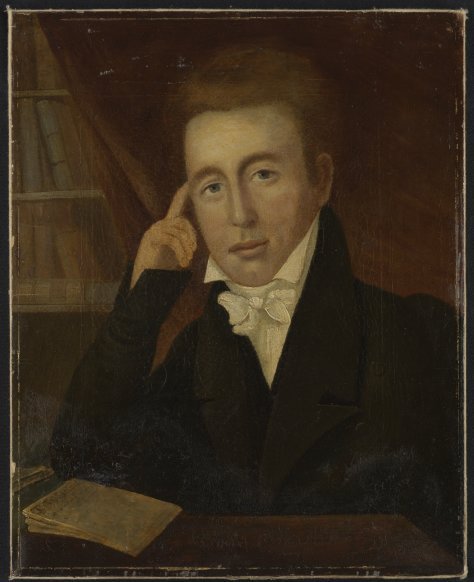
Right: Portrait of Edwin Smith Hall circa 1820 by Augustus Earle (1793-1838) Courtesy National Library of Australia -nla.gov.au/nla.pic-an2310341
Now as far as analogy goes between this case and mine, continued the Defendant, I have proved that I have repaired my pew. For the money I have paid has gone into a fund, and out of that fund it has been proved, the pews of St. James's are repaired. At home the parishioners don't repair the pews with their own hands, but by means of the parish-rate. It appears that before the Reformation, there were no such thing as pews in Churches. But it was not uncommon for persons to have moveable seats, still there were no fixed pews until after the Reformation. It became the practice for fixed pews to be left with the Ordinary, to appropriate them according to the rank and station of the parish. Hence arose the right of the Ordinary.
The custom of Church-Wardens appropriating, has been brought about by the neglect of the Ordinary to interfere; and so this new custom became law also, because says the Books, "it is a good custom."
In this Colony we have Mr. Scott, who it seems is the Commissary of the Bishop of this Diocese; I don't know whether the Commissary includes the office of Ordinary or not. At all events, neither the Ordinary nor the Church-wardens, on the ground of "avoiding contention and preserving the peace of the Church", ought to have the power to dispossess. As for instance suppose a respectable family had been used to occupy a certain pew for a long time, and that through the providence of God, the head of that family became a bankrupt. The family, according to the Solicitor General's law, would have to be put out of their ancient family pew, and thrust among the paupers at the other end of the Church, because they had fallen into poverty!
Hence then the expediency of investing the Ordinary with the power to appropriate, but not the power to dispossess. The power to dispossess would be sure to be exercised in all cases of petty malice, and in all the workings of party spirit. Thus there would be everlasting changing of pews, discord, and commotion. I challenge the Solicitor General to shew a solitary instance of a party having ever been dispossessed of his pew in England by the Ordinary at his caprice. And I infer, therefore that the once a party is regularly, inducted to his pew, there is no such thing in our law as dispossesing him, except by his death, and that is vacancy, not dispossession. I ground my defence chiefly upon this excellent principle, that the Ordinary has power to appropriate; but that for that very reason he has not the power to eject. I have proved in this case, that justice has not been dealt out with an even hand towards me, for, what has been practised towards me, has not been practised towards any other Parishioner of St. James's. There is no evidence of any other Parishioner having been moved from his pew without his consent! for when in certain instances, Parishioners complained of their removal they were put back to their old pews.
I did not understand Mr. Norton's first letter to me about a new pew. I really understood I was going to get a better pew! I began to suspect I must have mistaken Mr. 'Scott's character, in his giving me "the large double pew No. 45!" I was considering how it happened, that the Archdeacon should be so kind and courteous to me. (Great laughter.) (Letter was here read.) WOULD any body think after reading this letter, that it was intended to turn me out of a good pew, and thrust me to the other end of the Church ? however, a second letter was transmit ted me, much less equivocal, and I then began to understand, that I was not going to be accommodated to the extent I anticipated. I knew that the same sort of proceeding was not adopted towards any other Parishioner. I was not able to elicit the real motive for removing me from my pew. It could not have been for the sake of greater uniformity in the Church, because the Commissariat Officers did not think the pew in question so convenient as their old one, and there-fore would not accept it. At the same time, if it had been intimated to me, that my pew was wanted for uniformity's sake in the Church, and I had been offered one of the best of the new made pews in the Chancel end of the Church, I would have been the last person to object to a public arrangement. I could not then have come before the Court as I do now. For I have wished to appear before this Court, not as a contumelious person supported merely by the bare letter of the law, but as having equity, good manners, and a becoming respect to the authorities, in my favor.
I had a copy of a certain letter, but it appears I have mislaid it. (Here the Defendant searched for the letter) The Solicitor General, however, will perhaps do me the Justice to admit, he received such a letter, It was to the effect, that I did not wish this action to be brought on, and that if the Clergy would give me a pew equal to the one they had dispossessed me of, I would be satisfied.
I will now request your Honor, to reserve some points of law, which I have been advised arise out of this proceeding in my favour. 1st. That the King cannot bring an information for trespass. It ought to be for intrusion. 2ndly. Whether this information, (if it be determined by the Court that the Archdeacon is the Ordinary of N. S. Wales, and has the appropriation of pews), should, not be brought in his name, instead of the name of the King. 3rdly. Whether this proceeding ought not have been brought in the name of the Church and School Corporation. Whether the Ecclesiastical law of England, applies to this Colony generally or partially, in this instance, I will not presume to argue; For want of legal knowledge, it is impossible for me as a private individual to judge of this; but the Court will determine. I imagine there must be an act of Council to render this an action of this kind tenable. I find no precedent in the books to justify the dispossession of a particular person of his pew. I submit that before I can be ousted of my pew, and treated worse than other individuals, there should be some legal cause for so doing. It is a serious thing to harrass men's minds about these Church matters. What can vex and affect a man more than to be ejected from his seat in his Church, and thrust into a distant corner to be made a public spectacle of? Surely if the law ought ever to be distinct and clear, it ought to be upon such points as these. With these observations I leave my case to the Court.
I shall have to Call only one witness, that is Mr. Peter Mitt [sic?] Rapsey, who will prove the particular custom of the Parish his, father lived in, in London. It appears Mr. R. senr. paid a small sum of money in his Parish Church; the receipt specifies, that so long as he remains in the Parish he is to occupy the same pew. I shall call this Witness for the purpose of illustrating one of the principles I have laid down. (The Chief Justice did not think this evidence of any service. What was the custom of one place might not be the law of another. The Defendant withdrew the witness.) The Defendant therefore here closed his case, calling no witnesses. The Chief Justice addressed the Assessors at length, shewing the propriety in so novel and difficult a case, of their finding the facts of the case, and leaving it with the Court to decide the law another day, and so to record a special verdict. His Honor then recapitulated all the facts as proved in evidence. The Judge and Assessors then retired, and in about an hour returned, and again took their seats. His Honor read the special verdict, which was a brief history of the facts proved in evidence. The Court was then adjourned. The law of the case will be delivered by the three Judges some day next week. REX. v. E. S. HALL. (1828, September 27). The Sydney Monitor (NSW : 1828 - 1838), , p. 4 (AFTERNOON). Retrieved from http://nla.gov.au/nla.news-article31760738
More in: REX. v. E. S. HALL. (1828, October 6). The Sydney Monitor (NSW : 1828 - 1838), , p. 2. Retrieved from http://nla.gov.au/nla.news-article31760794
And what happened in the end in the above book!
We, of course, went delving into TROVE again to find a few Pittwater Incidents of this 'True Crimes' ilk for you that also illustrate what has and hasn't changed:
DON'T SHOOT: GUNMAN'S PLEA TO POLICE AT CAPTURE - HUNT ENDS ON THIRD DAY
ROBERT BROWN
SYDNEY— After the grimmest manhunt New South Wales has known Robert Michael Brown, 20, surrendered to two young police officers on Bushrangers' Hill, in the Sydney suburb, Newport, at 11.25 a.m. yesterday. Brown, who was dirty and dishevelled, was hiding in a crevice under a clump of bushes when the police arrested him.
With their guns drawn, the two policemen, Constables Clive Curtayne and George Spowart, stood over Brown as he crouched in the bushes and ordered him to surrender.
"Throw up your hands and submit quietly or we will shoot," Constable Curtayne ordered. Rising slowly to his feet and with both hands' in the air, Brown said: "I've had it. Don't shoot. You're too good. I'm all in. Give me a break. I've thrown my gun away. I'll go quietly." Brown's capture was the climax to the biggest search on land, sea, and air in the history of New South Wales. He had been at liberty for 62½ hours.
CONSTALBE Clive Curtayne. . . ordered the gunman to Surrender.
The police search for Brown began on Wednesday night after two policemen had been shot in a running gun battle between Bondi and La Perouse.
Ate meal
Brown threw back his head and stared defiantly at police and Press while his picture was taken from all angles. He made no attempt to conceal his face and made a couple of half -hearted wisecracks to photographers as the bulbs flashed. With the Commissioner of Police ( Mr. C. J. Delaney ) in the front seat, Brown was driven to the Collaroy Police Station where he dictated a long statement. While making the statement Brown ate ravenously and gulped down several cups of water. Later he smoked cigarettes and drank tea. It is understood that Brown commandeered the trawler Aklavic from The Spit about 9 p.m. on Friday and sailed it out of Sydney Harbour. The trawler struck heavy seas late on Friday night and about 1 a.m. yesterday it is believed that Brown dived overboard. Brown told police that the trawler was running against a strong wind and a high tide. The vessel was found firmly aground on the sand on Newport Beach. It showed no signs of serious damage.
“The swim knocked it out of me." Brown told police. "I didn't think I would make the shore. I've had practically no sleep since last Wednesday. It's been a terrible business."
After receiving countless false alarms, police finally pinpointed Brown soon after 9.15 a.m. yesterday, when residents sighted him on Bushrangers' Hill.
No shoes
An anonymous phone caller told police: "Brown is at Newport on Bushrangers' Hill. He has just gone into a house. I think the house is unoccupied." About 20 police cars, police trucks, and motor cycle police gathered at the foot of the hill, and the hunt began. A shout went up when Brown was sighted by police about 300 yards from a house. Brown, who was wearing a light sweatshirt, shorts, and gaberdine overcoat, was barefooted when police caught him. He showed only one visible sign of injury — a deep scratch on the left side of the face. He looked a picture of misery when police handcuffed him and marched him back to the main road, where scores of police had been posted. His shoulders sagged, and he was limping. His eyes were bloodshot, and he had a stubble of beard on his chin.
Had limp
At times police had to hold him up as he staggered through the dense bush back to the road. Placed in a police car between the two arresting officers, Brown said wearily: "There's no doubt about you boys, you're too hot." "For God's sake, give me a cigarette, and I want a drink of water. I'm thirsty and I'm hungry." "There was no need to worry about a gun. I threw it away. It went into the water. I had to throw it away."
CONSTABLE Harry Brennan ... set off the chase for the fugitive. On Wednesday night he chased a car for eight miles and fired six shots. Several bullets whizzed past his head.
Brown's grandmother, Mrs. Florence Brown, said today: "My grandson, Bobbie, is ill . . . mentally very ill ... I am sure of it."
Last Tuesday he had told her : "I've got women-trouble Nan. Bad women-trouble." Mrs. Brown said Brown's wife had a maintenance order out against him. His parents had divorced when he was about 16, and his father, a dog trainer; now lived at Southport, Queensland. After Brown had been questioned he was charged with the following: — Shooting with intent to murder Constable Harry Brennan, Detective Sergeant N Townsend, and Constable Len Ryan. Stealing a diesel trawler, valued at £5000, the property of Dr. T. J. Cottee, sen., dentist, of Military Road, Mosman. Disobeying a maintenance order. Having in his possession a motor car stolen from another State. Police refused bail and Brown will appear before the Central Court of Petty Sessions tomorrow.
Find car
Police late yesterday found a stolen Victorian car, in dense bush on St. Michael's golf course near Malabar with seven bullet holes in it. The car was reported stolen from Victoria at the beginning of the week. On Wednesday night about 25 shots were exchanged by police and a man in the car during a chase.
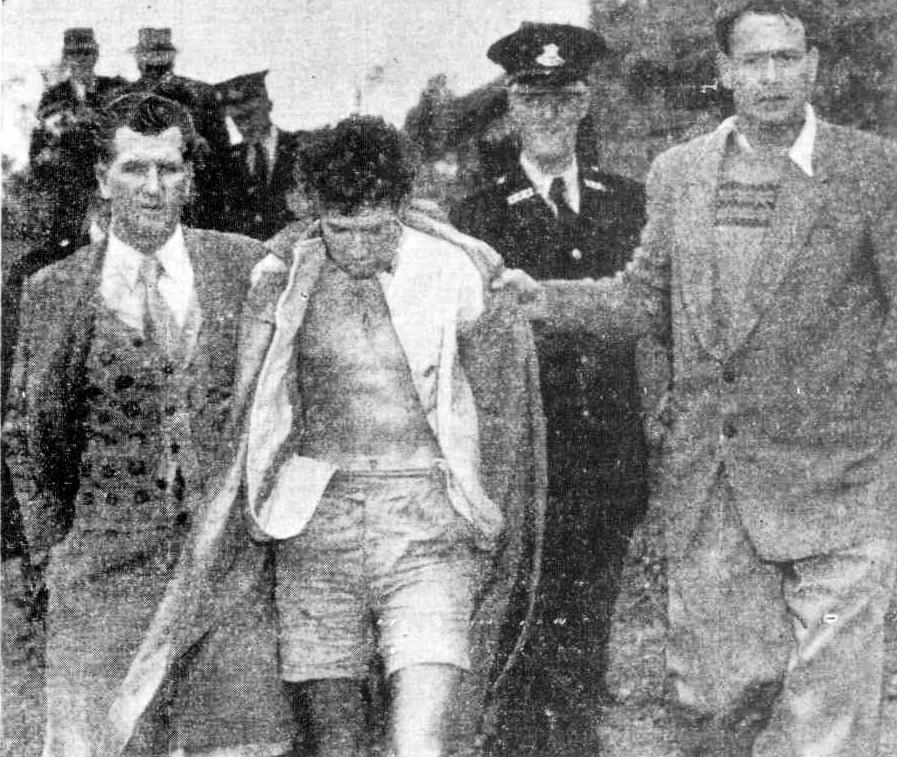
DETECTIVES escort fugitive gunman Robert Michael Brown, 20, to a waiting police car after his capture yesterday. — RADIOPHOTO. "DONT SHOOT": GUNMAN'S PLEA TO POLICE AT CAPTURE (1954, October 17).Sunday Mail (Brisbane) (Qld. : 1926 - 1954), p. 1. Retrieved from http://nla.gov.au/nla.news-article101726653
CAMERA STORY OF DRAMATIC CAPTURE
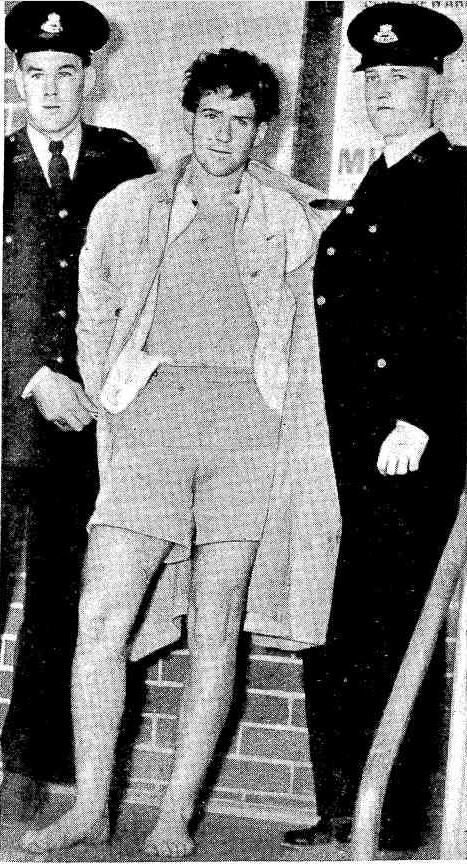
ROBERT BROWN at Collaroy police Station with Constables Clive Curtayne and George Spowart.
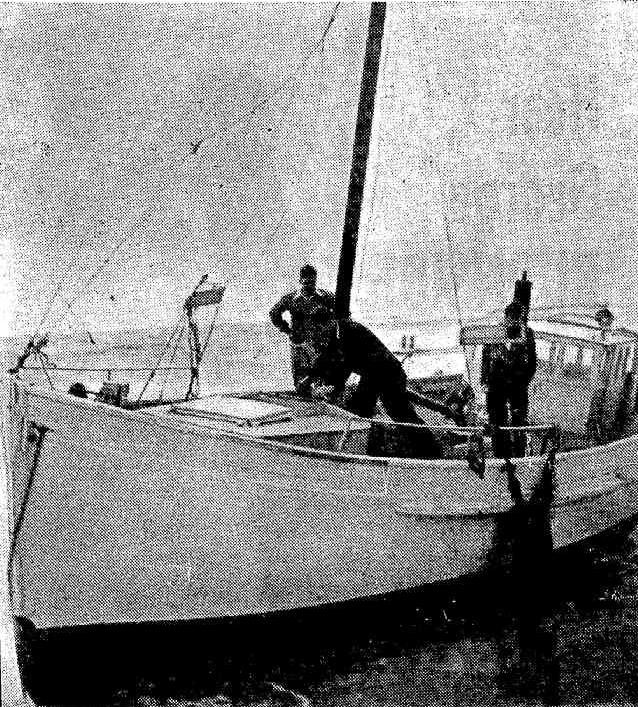
ABOVE: The trawler Aklavic stranded on Newport Beach yesterday morning. Police allege that Brown sailed it from The Spit to Newport.
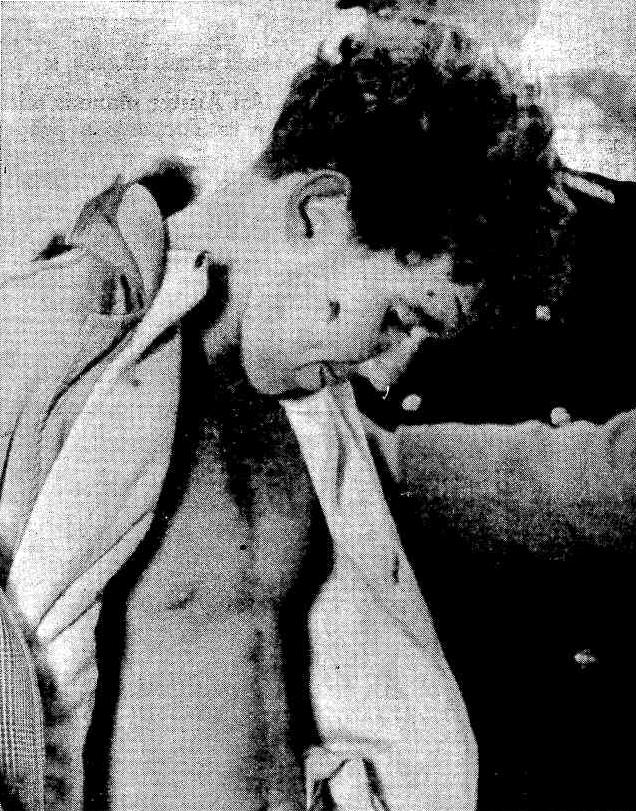
Brown, tired and dispirited, photographed a few minutes after Constables Curtayne and Spowrat had surprised him under a clump of bushes at Bushranger's Hill, at Newport.
RIGHT: Police leaving Collaroy Police Station for the C.I.B, with Brown. They have preferred nine charges against him. CAMERA STORY OF DRAMATIC CAPTURE (1954, October 17). The Sun-Herald (Sydney, NSW : 1953 - 1954), , p. 3. Retrieved from http://nla.gov.au/nla.news-article28663169
BROWN ON NINE CHARGES
Police yesterday charged Robert Michael Brown on nine counts at Collaroy police station.The charges are:
• Wounding with intent to murder Sergeant Towns-end and Constable J. Melton.
•Shooting at Constables H. Brennan and L. Ryan with intent to murder them.
•Stealing a diesel trawler, valued at £5,000, the property of Dr. T. J. Cottee, snr., dentist, of Military Road, Mosman.
•Having an unlicensed pistol in his possession.
•Disobeying a maintenance order.
•Having in his possession a motor car stolen from another State.
Handcuffed
After the charges had been read out to him, Brown was handcuffed and driven in a police car to Central police station. Surrounded by uniformed and plainclothes police," he was taken through the station and locked in a cell.
He will appear before Central Court of Petty Sessions at 10 a.m. tomorrow. BROWN ON NINE CHARGES (1954, October 17). The Sun-Herald (Sydney, NSW : 1953 - 1954), , p. 2. Retrieved from http://nla.gov.au/nla.news-article28663166
Brown in a special cell
SYDNEY. — Robert Michael Brown spent the week-end under special guard in a cell at Sydney's central Police Station. He had been captured at Newport, 18 miles north of Sydney, on Saturday, after a sensational 62 hour land, sea and air search. His father, who flew to Sydney from Brisbane when he heard that his son was captured, visited him three times yesterday. Visibly upset Police guards stood at a discreet distance while father and son talked softly. Both were visibly upset each time they parted. On one trip, Brown's father brought him some food and a vacuum flask of tea, but he also ate the regular prison meals. Brown in a special cell (1954, October 18).The Courier-Mail (Brisbane, Qld. : 1933 - 1954), p. 3. Retrieved from http://nla.gov.au/nla.news-article50614198
INTENDED TO KILL WIFE
Allegations Against Brown
SYDNEY, Monday: A man charged with attempting to murder four policemen said after his arrest that he had intended to kill his wife and himself, Central Court was told today.
This was stated by Det-Inspector Aldridge, when the hearing of seven charges against Robert Michael Brown 20, laborer, Manly opened. Brown, after an intensive hunt by police, was arrested at Newport. Brown is charged with: At Bondi on October 13. having wounded Sgt. Neville Townsend, with Intent to murder him. Having wounded Constable Charles John Melton with intent to murder him. Having shot at Constable Henry Brennan, with intent to murder. Having shot at Constable Leonard Ryan, with Intent to murder. Having used an unlicensed 9 mm pistol. Having stolen the trawler Aklavic from The Spit on October 14. Having in his custody a Holden car, stolen in Victoria. Solicitor P. N. Roach is appearing for Brown.
Det.-Inspector Aldridge said that about 11.45 am on October 16 he saw Brown at Collaroy Police Station, and Brown said: "I have made a nice mess of things shooting policemen and knocking off boats and cars. "The only thing I couldn't knock off was myself. I didn't have the guts."
Inspector Aldridge said Brown told him he drove from Melbourne to Sydney the previous Tuesday in the Holden car. Brown had added, "I was going to kill myself and my wife. I have been quarrelling with my wife for some time. "I tried to shoot myself in Melbourne but I didn't have the nerve and thought she might egg me on and I would be able to do it."
Aldridge said Brown told him that when he reached Sydney he went to Maroubra where he borrowed "a couple of quid" from his grandmother. He went to see some mates at Maroubra and then picked up his girl friend Gwen.
Aldridge said Brown added. "Next morning I went to my wife's place. I got her in the car and drove her to North Head. "I told her I was going to kill her and myself. I told her I was going to drive the car over the cliff. "But I didn't have the guts to do that. I then put the gun against her forehead and told her I would shoot her. "
Brown had said his wife started to laugh and said she did not believe him. He then fired two shots into the bus to show her he was "fair dinkum." He said his wife had two warrants out for his arrest and that after he had threatened to shoot her she told him she would withdraw them if he did not shoot her. He had then driven his wife home to Manly. INTENDED TO KILL WIFE (1954, November 2). National Advocate (Bathurst, NSW : 1889 - 1954), p. 2. Retrieved from http://nla.gov.au/nla.news-article164401343
BROWN TO STAND TRIAL
SYDNEY. Tuesday.—Robert Michael Brown will stand trial in Central Criminal Court next March. Brown, 20, of Darley Road, Manly, is charged with having, in October, wounded a police officer and shot at another with intent to prevent arrest, with possessing an unlicensed pistol and with larceny.
Brown is at present in custody in Long Bay Gaol.
Mr. Justice Dovey, in Central Criminal Court today, adjourned the trial until the first week in March on the application of solicitor. Mr. P. Roach, who made no application for bail. BROWN TO STAND TRIAL (1954, December 8). Northern Star (Lismore, NSW : 1876 - 1954), p. 1. Retrieved from http://nla.gov.au/nla.news-article96499719
Wanted to die, shot at police
Sydney, Monday
ROBERT MICHAEL BROWN, 21-year-old frogman, who wounded two policemen in a wild Sydney manhunt last October, was remanded for sentence after he pleaded guilty to seven charges in Central Criminal Court today.
Brown, from the witness box, said he had shot to draw police fire, because he wanted to die. Brown pleaded guilty to charges of having shot at two policemen, wounded two others, being in possession of a motor-car stolen from Melbourne, using an unlicensed pistol, and stealing the trawler Aklavic.
Detective-Inspector Aldridge said Brown worked as an aqualung diver with an underwater sideshow troupe known as "The Frogmen." He once held the Australian aqualung diving record with a dive of about 200ft.
On October 11 Melbourne C.I.B. sent a message Brown had left Melbourne In a stolen, car with the intention of shooting his wife, said Aldridge.
Next day he drove his wife to North Head, Sydney, where he threatened to shoot her and drive the car over the cliff. He let her free when she promised to withdraw a maintenance warrant. Wanted to die, shot at police (1955, March 29). The Argus (Melbourne, Vic. : 1848 - 1957), p. 8. Retrieved from http://nla.gov.au/nla.news-article71641922
Five Years Sentence
SYDNEY, Thursday, -
A young man who last year staged a running gun with police was sentenced to five years gaol By Mr. Justice Maguire in the Central Criminal Court today.
The man, Robert Michael Brown, 20, of Manly, smiled slightly at officials after he was led from the dock after the sentence. Brown had pleaded guilty to seven charges, two of them involving wounding two police officers with intent to prevent his lawful apprehension. He was sentenced to five years on each of these counts. Brown was sentenced to three years for having a stolen car in his possession; six months for having used a pistol without a license, two years for stealing a trawler from Mosman. The sentences are to be served concurrently. Justice Maguire told Brown he did not believe Brown's claim he fired at the policemen to bring about his own death. 'You resolved to escape from the police at any costs. Your attitude was one of compile irresponsibility,' His Honour said. 'The callous indifference you showed to the rights of other people call for a very serious view of your conduct,' he added. Five Years Sentence (1955, March 31).The North Western Courier (Narrabri, NSW : 1913 - 1955), , p. 1. Retrieved from http://nla.gov.au/nla.news-article135053718
Crown appeal on sentence
SYDNEY, Thursday : The Crown will appeal against a five years' gaol sentence imposed on Robert Michael Brown, 21, frogman, for a number of offences, including maliciously shooting at police.
Mr. Sheahan, Attorney General, said today he had directed that an appeal be lodged. On March 31 Judge Maguire imposed two sentences of five years, one of three years, two years, and one of six months' gaol, on Brown. Crown appeal on sentence (1955, April 22).The Argus (Melbourne, Vic. : 1848 - 1957), p. 5. Retrieved from http://nla.gov.au/nla.news-article71877948
Sentence Doubled On Appeal
SYDNEY, Friday.
A former professional frogman who featured in one of the biggest man hunts of recent times, had his gaol sentence doubled to 10 years to-day.
Robert Michael Brown, 21, was sentenced to five years gaol by Mr. Justice Maguire in March.
Brown was convicted of having wounded two policemen with intent to kill. He was also convicted of stealing a car and a trawler and carrying an unlicensed pistol.
The Supreme Court heard an appeal by the Attorney-General on the ground that the sentence was inadequate. Sentence Doubled On Appeal (1955, October 8). The Canberra Times (ACT : 1926 - 1995), , p. 4. Retrieved from http://nla.gov.au/nla.news-article91210113
A happier day for Mr. Brown, and only a few months earlier that same year:
Three Dance On Harbor Bed
After 200 Ft. Dive
SYDNEY. — Three young men set a Southern Hemisphere diving record with aqualungs on Sunday, going 200 ft. to the bed of Sydney Harbor. By the light of a torch, they danced and shook hands on the muddy bottom. The previous Australian record was 112 ft. — set in recent weeks. The divers — Dave Rawling, 24, of Hurstville, Bob Brown, 21, of Seaforth and Ron Harding, 20, of Manly — used Melbourne-made water lungs which permit the diver to stay down for nearly an hour. They had intended to go to only 106 ft., but said that they were not distressed at 200 ft. They dived at Ball's Point — one of the deepest trenches in Port Jackson — wore spearfishing masks, sweaters and swim trunks -with water lungs strapped to their backs and pressure gauges on their wrists. First, they lowered a brick tied to more than 200 feet of rope, into the water and at 2.28 p.m. they dived Two minutes later two others followed them, intending to go about hail way down in case the first group got into difficulties coming up again. First news that the divers had broken the record was at 2.43 p.m. when one of the second group broke the surface of the water, blood flowing from an ear, and held up his hands in triumph. He had to submerge again as he had come up too quickly in his haste to break the news. At 2.50 p.m. the three divers surfaced, waving and shouting excitedly. 'We did it,' Rawling shouted and, as proof, he had tied a handkerchief he had worn around his neck to the brick at the bottom They were abnormally exhilarated when they got into the boat but quieted down when their doctor told them to sit quietly for a few minutes. - They said later that a deeper dive should not be attempted with present equipment in Australia.
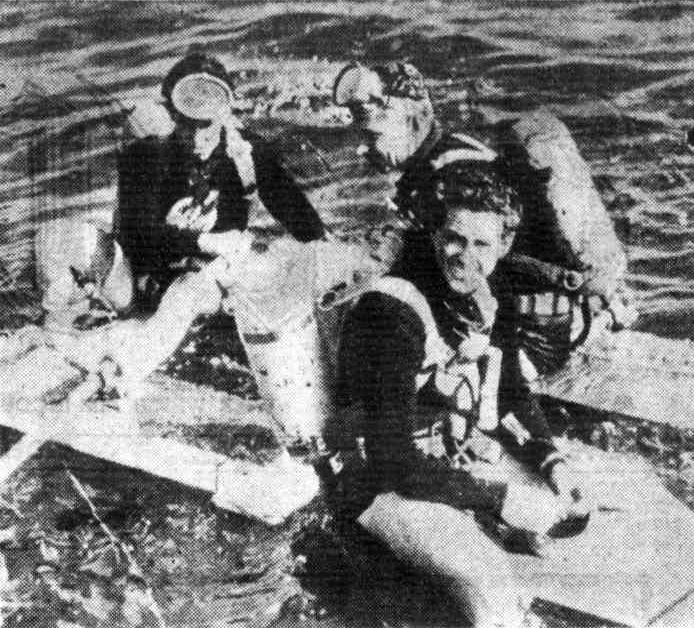
The record-breaking divers, with their equipment, on a raft in Sydney Harbor. They are (from left) Bob Brown, Dave Rawling and Ron Harding. Three Dance On Harbor Bed After 200 Ft Dive (1954, April 15). Chronicle (Adelaide, SA : 1895 - 1954), , p. 2. Retrieved from http://nla.gov.au/nla.news-article93946961
_____________________________________________
Mystery Shrouds Death IN SEASIDE SWAMP
Puzzling New Facts About End Of May Mathews
MYSTERY, absolute and impenetrable, still surrounds the death of Florence May Mathews, the rich 21 -years-old girl whose skeleton was found on March 2 in a marsh at North Narrabeen. THE Government Analyst has been unable to find poison in die remains or in the earth gathered from beneath and around the bleached bones. BUT ADDITIONAL FACTS HAVE BEEN DISCOVERED WHICH MAKE THE MYSTERY OF THE DEATH MORE BAFFLING.
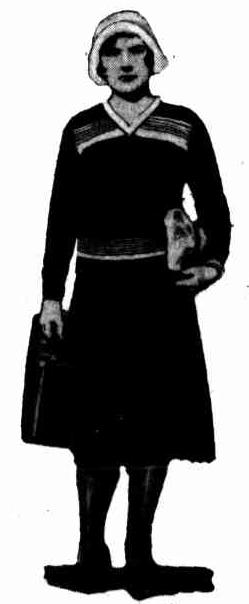 FOR instance, her shoes have not been found. A coincidence is that a man was found dead at North Narrabeen a couple of weeks after the girl disappeared from her home. The material facts of the Florence May Mathews case are widely known, for when she disappeared from her home on September 21 last year there was a search for her throughout the Commonwealth. Although she had two bank accounts, hundreds of pounds worth of jewellery and many pretty frocks, she took nothing with her when she left the mansion of her uncle, William Henry Harris at Cheltenham. She was learning frock-designing In the city and she left home at the usual hour for the railway station. A girl friend who travelled with her towards the city on that fateful morning says that the girl did not leave the train at Central Station as was her custom but that she travelled onward to Wynyard Station. She never returned home.
FOR instance, her shoes have not been found. A coincidence is that a man was found dead at North Narrabeen a couple of weeks after the girl disappeared from her home. The material facts of the Florence May Mathews case are widely known, for when she disappeared from her home on September 21 last year there was a search for her throughout the Commonwealth. Although she had two bank accounts, hundreds of pounds worth of jewellery and many pretty frocks, she took nothing with her when she left the mansion of her uncle, William Henry Harris at Cheltenham. She was learning frock-designing In the city and she left home at the usual hour for the railway station. A girl friend who travelled with her towards the city on that fateful morning says that the girl did not leave the train at Central Station as was her custom but that she travelled onward to Wynyard Station. She never returned home.
MYSTERY SURROUNDS HER TRAGIC DEATH. — Florence May Matthews.
The first theory was that she had run away from her guardian's homr, but the fact that she left her bank books, jewellery and frocks behind appeared to dissolve this theory. Her uncle offered a reward of £50 for Information concerning her whereabouts and the police worked overtime searching for her. No information was secured until her skeleton was found in a marsh close to the Old Powder Works-road at North Narrabeen. This grim discovery has only made the mystery more profound. She disappeared on September 21 and must have taken a circuitous route to reach the spot where her body was found. But not a solitary soul has come forward with an acknowledgment of having seen the girl in this locality. Most of the local residents think that they would have noticed her if she — an utter stranger— had been seen in the vicinity.
A QUAGMIRE
And these residents declare that this girl could not possibly have reached the spot where her body was found. In September the marsh was a treacherous quagmire. It is always flooded in the winter and autumn and only the local residents can cross from one side to the other, stepping from what little patches of solid ground they know from years of experience. A stranger, they think, could not cross to the spot in the marsh where the skeleton was found.
Florence May Mathews disappeared on September 21 and on October 14— less than a month later — the body of Francis Howard was found dead In his bed within a stone's throw of the place where the girl's skeleton was discovered. Howard had been dead for some time when his corpse was found. Probably he had been dead for about a week. An old man— he was 76 years of age — he had been treated for heart attacks. A certificate that death was due to heart failure was given. It is a strange coincidence, but there is positively nothing to connect the two deaths. The girl's body was lying In a position of composure, just as if she had passed away In her sleep. An inquest into her death will be held at the Coroner's Court tomorrow, but it seems that the mystery will never be solved. Mystery Shrouds Death IN SEASIDE SWAMP (1933, March 26). Truth (Sydney, NSW : 1894 - 1954), , p. 16. Retrieved from http://nla.gov.au/nla.news-article169303956
MAY MATTHEWS. MYSTERIOUS DEATH.
CORONER'S INQUEST.
The mysterious death of Florence May Matthews, who left home at Cheltenham on September 21, 1932, and whose remains were subsequently found in a lonely swamp at North Narrabeen, was inquired into by the City Coroner (Mr. H. H. Farrington) yesterday.
When the body was found there were no marks of violence upon it and an analysis revealed no traces of poison. The body was stretched out as if the woman had died in sleep; her spectacles were still in their place, a purse containing money and a key was close at hand and there were no indications of a struggle.
Dr. Edwin John Davis said he had treated Miss Matthews many times. She was inclined to be quiet, sometimes morose, hard to extract confidence from, and not easy to converse with. She was slightly sub-normal. It was possible her condition might produce slight melancholia.
Mr. McRae (for the police): Do you think she was at any time likely to develop suicidal tendencies?—I am not prepared to express an opinion on that matter. I do know she was very much "cut up" at her aunt's death in 1930.
Witness said that the girl was well treated in the home; everything that money could buy was showered upon her. MAY MATTHEWS. (1933, March 28). The Sydney Morning Herald (NSW : 1842 - 1954), , p. 10. Retrieved from http://nla.gov.au/nla.news-article16983048